As an intrinsic part of their cultural heritage, Troy and Jarrell have been surrounded by delicious Jamaican food their whole life. What began as a means to share food with friends and family quickly blossomed into a takeaway business before growing into the well-established brand that they are today.
Their successful engagement with the takeaway market precipitated them opening a dark kitchen and from there they continued to grow becoming the first black-owned Caribbean business in Selfridges history; and they’re not stopping there! With plans to expand outside of the city and continue sharing their creative, unique and (of course) delectable food across the nation, Juici Jerk have high hopes for the future and after sitting down with Troy, it’s not hard to believe they will achieve every one of their goals.
Can you tell me how it all began?
Myself and my older brother Jarrell started the business five years ago; it seems like a whole life time ago now! We’re from South London but our parents are from Jamaica. We come from a traditional Caribbean household and food is a massive part of our culture but in our local area of Tooting there isn’t much accessible Caribbean food. At first it wasn’t a business, we just used to always be in the garden cooking food for friends and family and it kind of developed from there. We started thinking ‘let’s maybe just start selling this a little bit,’ and it started off with every Friday, and then it was every Wednesday and Friday and then it just grew and grew. Then we had a lightbulb moment after we started getting big orders from stores calling for their lunch order. So then we rented ourselves a commercial kitchen and that’s when we went onto delivery platforms. That’s when we were exposed to a whole new demographic of customers; people that we didn’t know at all! Fast forward 12 months and we were doing street food catering and event catering. Then the pandemic hit which was really hard because we had to leave a lot of our residencies. Luckily we had the dark kitchen going and we had launched meal kits which I would say definitely propelled the brand because we were shipping to all these new locations. Off the back of that we got the Selfridges gig once things started to open back up and that changed everything for us I would say. We were the first black-owned Caribbean business in Selfridges history. We were only supposed to be there for two weeks, then one month, then three months and now we’ve just signed a two year contract. It’s been a very challenging five years but very, very exciting.
That’s incredible and interesting to hear about the difference. I’m of Jamaican descent as well so I understand the cultural significance of food, but I would say that Caribbean food is much more easily accessible here in Birmingham.
Well we’ve actually been talking with Selfridges about their one in the Bullring and from what they’ve been saying there is a significant Caribbean demographic in Birmingham so we would do really well there. I think one thing that kind of sets us apart from traditional Caribbean shops and eateries in London and beyond is that we kind of take a fresh approach and that’s from everything from the food to our branding. Obviously we still have all the fresh, fun elements of the Caribbean, I think we just make it a bit more contemporary whereas as some Caribbean shops keep their roots in the past. For example our Selfridges model is a quick-serve restaurant so it’s like grab and go food, bagels, jerk chicken wraps and people can customise their wraps. People love that element because it’s not something that is really associated with Caribbean food but it’s great and it works.
How fantastic, I was actually going to ask why do you think that Jamaican food, or Caribbean food as a whole, is sometimes not viewed as ‘restaurant food?’ There are definitely Jamaican restaurants, but it sounds like you guys are doing an amazing job in showcasing that this type of cuisine is just as valid in a restaurant setting as say French cuisine.
I think there are a few different reasons. I think it can sometimes be hard for people of Caribbean descent to go to a Caribbean restaurant without being overly critical and that can be detrimental to our collective growth. In terms of its accessibility, I think people sometimes just view it as a ‘nice takeaway’ but wouldn’t expect to sit down in a restaurant setting to eat it. It’s a shame but I feel like the food itself is accepted by so many people. So I think it’s up to people like me and newer Caribbean brands to showcase the potential of this cuisine and highlight that it’s not just the same things that you used to see 10 years ago.
In terms of growth, how are you hoping to see your business grow in 2023?
We are beginning talks to find an investor now. At the moment we are still fully self-funded; it’s still completely owned by me and my brother, but we’ve realised that we’ve kind of hit a ceiling now and in order to really grow where we want to on a national scale, we need a bit of money and a bit of infrastructure from someone who has that experience. So that is what we are carefully looking for now, we’ve declined a few offers because we know that it is a really big task finding the right investor. Now is the time for us to find out what we want for the next 10 years and how we’re going to get there.
Can you tell me about Soho House? The pictures look amazing and I wanted to ask if that was Stormzy that I spotted in one of them!
Yeah! He came down because his sister Rachael is a DJ and she was deejaying at one of our Soulful Sunday specials. We partner with Soho House to take over their kitchen. We started at White City house which is opposite Westfield Shopping Centre and it was really cool, we would take over the kitchen on a Sunday and provide a tasting menu to all the guests in the house. That was the first time we had a sit down experience with our food, it was a bit more fine dining, still casual and relaxed but it was great because associating ourselves with Soho House has also taken the brand to new levels. Soho House is a massive brand and it has been successful because we ended up doing a summer partnership and residency on the rooftop with them last year and this year we’re going to be doing the same.
You do both event catering and run a bricks and mortar premises and I can imagine they have very different requirements. What would you say are the main differences and do you have a preference?
I get joy from both but it’s also about making sure that the business is resilient to any changes that could happen in the future. Covid showed us that you have to be ready for anything and unfortunately right now everything in the hospitality industry is on the rise; food costs, staffing costs, electricity. So we’ve got to make a business model that is robust and sufficient enough to survive. We have quite a few different offerings; what we do at Selfridges is completely different to Soho House. Soho House is different because we get to see people sit down, have a drink and interact with their friends and family; it’s a proper vibe. Event catering has its own buzz, I feel like that’s my favourite just because when you go to an event you’re always looking to have fun and then when the food is good it tops your night. Seeing people enjoy our food when they are at an event is an amazing feeling and this year we’ve been blessed with a lot of big events, we’ve worked with Nike, we’ve worked with Amazon; so many big brands!
I would argue that Caribbean food has always been a massive part of street food, if we think about Notting Hill Carnival, the food has always been a notable part of the event. Why do you think it’s such a foundation of street food?
I think because it’s now a bit more mainstream and there are these big corporate brands getting involved, people forget that street food is just that; food that comes from the street. What that effectively means is that it is not food that you would get in a restaurant. You can get that type of food in restaurants now, but the original street food is food that derived from the very street itself. For example in Jamaica you could be walking and see someone selling jerk chicken in the road. So I think we as Jamaicans have this natural ethos of knowing what street food is and that’s why it works so well.
Yeah that’s very much at the heart of both street food and a lot of Caribbean culture; it’s convenient, it’s cheap and it’s tasty. Something I really wanted to ask; I know that your business was inspired by your Mum’s recipes and her cooking. What does she think of your food?
She’s very critical, she’ll criticise anything! She doesn’t eat meat at the moment but she’s still got her hooks in the curry goat recipe! No she loves it but she’s still being a Mum where she can be a bit critical and say ‘use more of this’ or ‘use less of that! But there are no actual measures for anything!
I think that’s part of why I never cook for my Mum! So we’ve spoken about your goals for growth and what you’re hoping for your business this year. What kind of external support would help, not just your business but other independent food and drink businesses, to thrive this year?
Good question, I would definitely say there needs to be focus on getting good staff because I feel like we’ve kind of hit a break wall in terms of where to look for staff now. I’m having no luck on the traditional websites or social media and I’m paying money to advertise and not getting anything back. I feel like it would be beneficial if there was a robust portal where employers and business owners can have the resources to find people who actually want to work in the industry, not just people who are looking for a job and then they leave the after they realise that it’s not for them. So I think any kind of resources, such as links to catering schools or colleges that can specifically encourage people to come into the industry, knowing what to expect and getting them excited about working in it, would be beneficial. But I definitely think that it should be around staffing as that is one of the biggest crises that we’ve got and that we’ll have for the foreseeable future.
I agree, it’s not just about getting the numbers into the industry, it’s ensuring that the people coming in know what to expect and that it’s what they want. You mentioned social media as a useful platform, one last question, what is the importance of social media to your business and why do you think it’s so important for other independent food and drink businesses?
So we started out on social media and we’ve been lucky to capitalise on that. We realised early on how important it is because everyone is on social media and it allows you to communicate your brand in a new way. It allows us to interact with our customers and show them new things that we’re doing. Everything is very visual on Instagram and I feel like as a food business, having an Instagram isn’t even a choice; you need to have it now, it’s almost mandatory.
Troy and Jarrell have worked hard to make Juici Jerk the powerhouse that it is today and they aren’t stopping there! With new ventures on the horizon keep your eye out for new announcements from them here or on their Instagram here. You can stay up to date with other articles featured in Issue 49 of Catering Quarterly here.





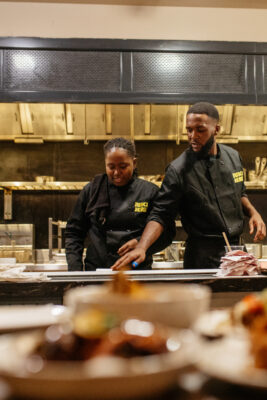
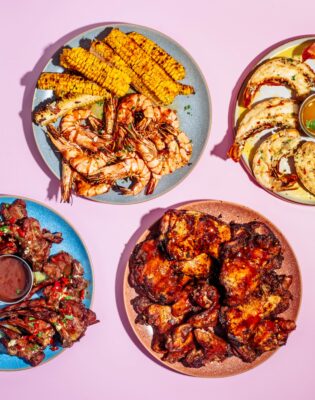
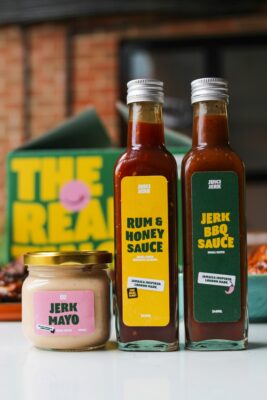
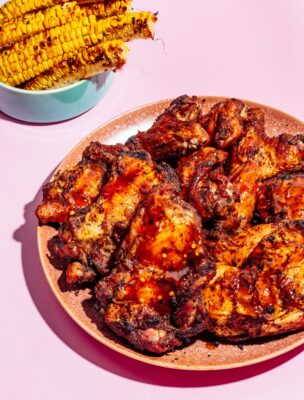
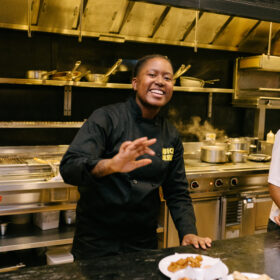
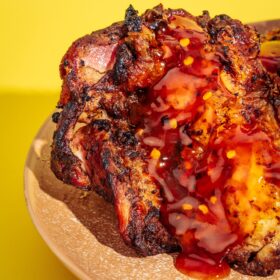
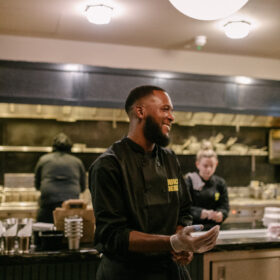

 Featured Training
Featured Training
OUR MEMBERSHIP
We're here to help make your catering business a success. Whether that be starting up or getting on top of your compliance and marketing. We're here to help you succeed.
Want our latest content?
Subscribe to our mailing list and get weekly insights, resources and articles for free
Get the emails